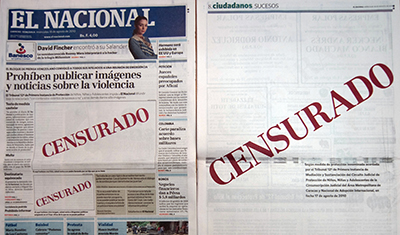New York, August 12, 2013–The Committee to Protect Journalists condemns the ruling by a Venezuelan judge against two dailies last week that bans the publication of violent photographs and imposes hefty fines, according to news reports.
In her decision on Thursday, Judge Betilde Araque prohibited the Caracas-based dailies El Nacional and Tal Cual from publishing “images of violent content, guns, physical aggression, bloody scenes and naked cadavers” and fined both outlets the equivalent of 1 percent of their 2009 earnings, according to news reports. Both outlets have said they will appeal the decision, according to news reports.
The ruling stemmed from the publication of a front-page, archival photograph in El Nacional on August 13, 2010, that showed corpses piled up in a local morgue as part of a news report on rising crime in Venezuela. The image was republished by Tal Cual three days later in an act of solidarity as authorities moved to crack down on El Nacional.
Judge Araque ruled that the images constituted a danger to the psychological well-being of minors and that the dailies had violated a Venezuelan law aimed at protecting children and adolescents. The ban on violent images only applies to the dailies, but the federal Attorney General’s office said in a statement on its website that it was looking into the possibility of extending the measure to other news outlets.
“The decision against El Nacional and Tal Cual clearly constitutes an act of censorship. We call on the Venezuelan courts to reverse it upon appeal,” said Carlos Lauría, CPJ’s senior program coordinator for the Americas. “The Venezuelan press should not be punished for reporting aggressively on issues of public interest.”
The case originally stemmed from complaints filed by two citizens who were described in some news accounts as members of a group that was sympathetic to the government. In the days after the publication of the image, a Venezuelan court issued a temporary injunction barring all print media from publishing violent images for one month.
The general ban was lifted after a local and international uproar, but the temporary ban remained in place against El Nacional and Tal Cual, both of which have been critical of the government. At the time, El Nacional‘s editor, Miguel Otero, suggested to CPJ that the government’s actions were designed to stifle reporting on violence and crime–sources of major concern in Venezuela–in the month before legislative elections.
The decision comes amid a climate of political tension in Venezuela as government critics allege that President Nicolás Maduro, who won a narrow election in April, is leading a renewed crackdown against opposition figures and critical media, according to news reports and local press freedom groups.
- For more data and analysis, visit CPJ’s Venezuela page here.
